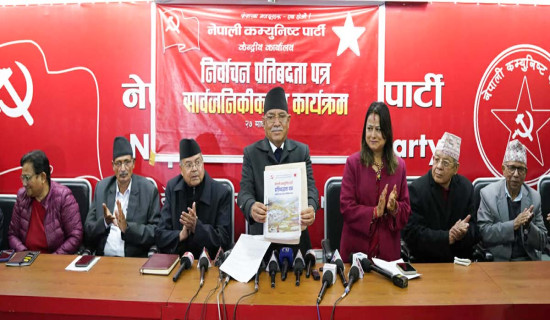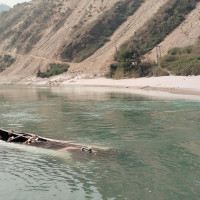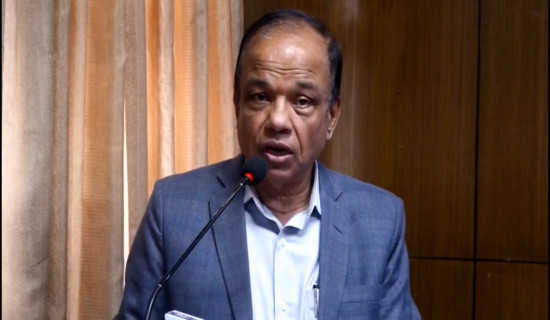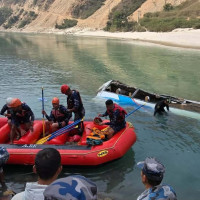- Wednesday, 11 February 2026
Embrace Indigenous Model Of Development
Development is a process of realising the nation’s full potential and supporting people to exercise their informed choice. Nepal can flare development, ensure livelihood of its people, retain youth population and multiply global cooperation if it does not uncritically accept epistemological bedlam and ground its process on contextual ideas apt to national needs. Development is a value-laden concept, not value-neutral, which seeks the splendid compatibility of ends and means. It empowers the weak and deflects the archaic notion of curse of sati and outer view that the nation is resource scarce. The values of people’s participation in the empirical indicators of progress can improve the quality of life of Nepalis. One strategy is policy coherences across ecological, social, economic and political scales whereby each wires the other in a virtuous cycle. Nepal has faced each development concept puncturing the other without building on it.
Two vital elements are: ecological, cultural and moral sensitivities and material progress — the last one fulfills national priorities including basic needs while the first three expect to boost cooperation in areas of shared interests. The other strategy is coordinating conduct at domestic (local and national), regional (regional shared good) and international institutional levels (global common good) and harvests benefits from the cooperation. Proper coordination can self-amplify positive effects, reduce transaction costs and spawns synergy of outcomes. Nepal’s much-touted constitutional reforms are aimed to solve disputes among the federal, provincial and local levels in matters of power balance, resources and authorities distribution in an inclusive manner and supply public goods. Ordinances for good governance and investment are enacted to this effect. It creates a fairly equal stake of all Nepalis and even playing field despite their physical, social, economic and cultural peculiarities.
Topographical variation
The nation’s topographical variation offers great scope for production and business specialisation while its cultural and ecological panoramas are of great tourist attraction. Spiritualism has eased group differences and contributed to national unity while post-national environmentalism entails global cooperation, connectivity and communication. Still the other strategy is the use of apt technology, planning, innovation and investments with no disruptive effects on jobs and social balance. It is vital to overcome rising ecological deficits of Himalayan, mountain and southern plains, rising deforestation, erosion of the fertility of soil and dipping of water table thus rising vulnerability of people. Nepalis' ability to use modern technology to improve their life and repair the ecology, economy and society can promise their welfare and enable leaders to navigate the future without ruining the future generations.
Educating people to capitalise the positive effects of science on education, production, reduction of human toil and health can unfreeze Nepalis into castes, classes and genders. Judgment requires coherence on reflection, beliefs and thinking on vital issues to be tackled on the basis of inter-subjective knowledge, intelligence and skills that balances the top and bottom of society. Obviously scientific culture fosters transparency and merit, not arrogance and narcissism. The latter vices kill human virtues of a synchronized life. One irony of Nepal’s development is the formulation of a rational choice model of elite-driven development, not constitutional choice able to steer the nation in a coherent direction.
As a result, Nepali leadership failed to foster indigenous development by coordinating public, private and cooperative economy and a range of nested actors such as business, civil society, NGOs and community organizations working at the grassroots level by tailoring rules to local progress. These institutions have not been able to evolve indigenous insights, experience and knowledge pertinent to local entrepreneurial dynamism. One irony of Nepali’s intellectual culture is turning too conformist to any concept of development, and is crude rationalisation, rather than questioning its utility and outcome for production revolution. Indigenous progress applauds feeling and faith’s ritual and communal aspects over rational choice. Conscious public thinks the coherence of development is a key to enable people to give reason for their own priority, claim their rights and negotiate the valid ones.
Nepal requires a vital impetus to economic reforms central to creating an investment-friendly milieu and providing incentives to investors, donors and the international community to engage in balancing the real and symbolic economies. There is no need for Nepal to stumble into the pitfalls of neo-liberalism and remain powerless to transform its ongoing disorder into a stable progress of rural and urban areas and agricultural and industrial progress. An increase in self-awareness of innocent Nepalis about the condition of living, an inapt development paradigm imposed into them by the government to delink economy, health, education and citizenship from the state. Nepali legislators have also raised security questions on national identity cards. “Our digital identity belongs neither to us nor to the state,” argues Yanis Faroufakis. The consumerism of urban culture does not work for the entire nation which is largely rural, agrarian and informal but has enormous potential for product specialisation to respond to livelihood needs and market demand.
Coherent development seeks to boost the effectiveness of equitable development by means of the abolition of overlapping projects, resolution of incongruity at the ideological levels and capture the synergy of positive policies beneficial to all Nepalis like the public goods. Without these and alignment of global public goods to national priorities, it is difficult to reduce the internal and external dependence of people, enable them to live together in harmony and set free their souls. The reduction of causes of structural injustice evolves a mature society with people-state interface, a fair and sustainable economy and concrete welfare measures of the Nepali polity which balances the tax base, macroeconomic parameters, ecological and social justice and proportional representation of diverse people in the governance.
Nepalis are longing for fervent aspiration for sustainable development and regain the heritage of tolerance to shape their free-spirited character. Freedom is the locus of modern progress, a freedom that can offer Nepalis choices to set priorities, work for their realisation, collect resources to fill the gaps in finance and lift up the poor. Democracy thrives on sound public knowledge of the leaders to respond to public opinion, progressive public policy and cohesive action so that the possibility of poverty, inequality, alienation and violence is reduced from the public life. In this sense coherence exists between participatory democracy and sustainable progress as both make the people owner of the outcome, build their stake in them and enable them to forge compromise.
A sensible leadership is critical because it can combine ecological and social sensibility and national mood, coordinate the progress and enable even the poor to reap the benefits of modern civilization. Those elites engaged in the formal sectors and honing the selfish value of getting rich quick by any means — fraud, unsettled accounts, misplaced priorities and ecological ruins - which impose an inordinate drain on economic life. Those working in an informal sector secure barely enough to learn for life and living and flee desolate existence. Development coherence aims to address the systematic exclusion of free-riders as it poses institutional impediment to social mobility and social change. Many non-economic phenomena affect the continuity of the development process in Nepal.
The economic security of Nepalis requires a deeper bond shaped by its ancient values of right livelihood and modern democratic norms from which no person is enduringly excluded. Most conflicts in Nepal arose out of a conceptual design emerging from an alien model having no utility, values and interests even if they fuel good cause. Democracy, human rights, justice and peace require leaders to act for the common good beyond pious promises which may not be enforceable. So far the nation’s progress indicates a discrepancy between resources deployed and the outcome. The government often speaks of hope in each plan without encouraging means for animating the goals. Previous anthropocentric progress that focused on human bond only has been replaced by the bonding with nature and species beings.
Social justice
Nepali leaders have to consider social justice that matches with the constitution, Sustainable Development Goals of the UN and several human rights obligations the nation has endorsed. They have put an additional burden on Nepali state beyond its institutional and economic muscle. The existing economic and political monopoly of power and wealth may risk disrupting democracy. It is, therefore, essential for leadership and policy making elites to find common cause in connectivity and infrastructure development, mutual interest and affection with the ordinary Nepalis and keep their hopes in productive life alive. Elite’s enlightenment approach to rational progress is deterministic not derived from the common sense wisdom of people derived from the complex logic of post-national natural environment and national culture.
Constant readiness of various groups for agitation does not lay the template of progress. Development entails continuity, not disruption of institutions and policies. Intuitional reforms affect economic interests, culture, nature and social life. It produces basic means to survive and prosper. Certain leaders prefer a radical break from indigenous culture, whose reason is far from clear. Exogenous elements -- science, technology, management and admin practices -- adjust with culture.
The nation has to synergiSe the productivity of land, labour, capital and technology and improve the economy of scale so that the present development outcome does not become the replica of the future. Governing the common in Nepal requires stern regulations. Or else, as Garret Harding says, “Freedom in the commons brings ruin to all.” Nepal’s coherence on development requires a search for the causes of backwardness that gives meaning to existence and experience and an impetus to continuous institutional adaptation on a long term basis.
(Former Reader at the Department of Political Science, TU, Dahal writes on political and social issues.)





-square-thumb.jpg)


-square-thumb.jpg)








